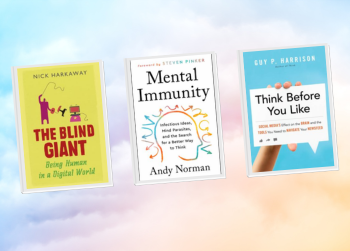It’s so easy to do isn’t it, spending ages just doomscrolling through Twitter, TikTok, YouTube, Facebook, Instagram… whatever your social media of preference is. Sometimes it’s just the timesuck of escapism, endless cat videos, meme sharing and satisfying content where corners line up, machines produce rows and rows of perfect replicas and coloured sand can be cut into precise shapes. Or maybe you find yourself getting caught up in internet drama that really takes more of your precious time and energy than you should let it.
We’ve gathered a list of titles to help you curate your social media so that it keeps you connected, entertained and informed, and give you control over your social media experience.
Smarter than you think : how technology is changing our minds for the better / Thompson, K. C.
“A brilliant examination into how the internet is profoundly changing the way we think. In this groundbreaking book, Wired writer Clive Thompson argues that the internet is boosting our brainpower, encouraging new ways of thinking, and making us more not less intelligent as is so often claimed. Lucidly written and argued, ‘Smarter Than You Think’ is a breathtaking original look at our Brave New World.” (Adapted from Catalogue)
Mental immunity : infectious ideas, mind-parasites, and the search for a better way to think / Norman, Andy
“Philosopher Andy Norman dives into the world of mind-parasites, ideas that cause destructive thinking and extremism, and describes how to inoculate your mind to keep it safe from bad ideas”– Provided by publisher.” (Catalogue)
Think before you like : social media’s effect on the brain and the tools you need to navigate your newsfeed / Harrison, Guy P
“Social media has pitfalls: misinformation, pseudoscience, fraud, and irrational beliefs, presented in an attractive, easy-to-share form. It reinforces your biases by tracking your preferences: it sends only filtered newsfeeds, so that you rarely see anything that might challenge your set notions. Harrison demonstrates how critical thinking can enhance the benefits of social media, while giving readers the skills to guard against its dangers. He also suggests ways to protect yourself against privacy invasion, trolls, and the confusion over fake news versus credible journalism.” (Catalogue)
The blind giant : how to survive in the digital age / Harkaway, Nick
“The digital age. An age of isolation, warped communication, disintegrating community. Where unfiltered and unregulated information pours relentlessly into our lives, destroying what it means to be human. Or an age of marvels. Where there is a world of wonder at our fingertips.” (Catalogue)
Breaking the social media prism : how to make our platforms less polarizing / Bail, Christopher
“This book examines how social media functions like a prism that distorts our identities, empowers status-seeking extremists, and renders moderates all but invisible. It challenges common myths about echo chambers, foreign misinformation campaigns, and radicalizing algorithms, revealing that the solution to political tribalism lies deep inside ourselves.” (Catalogue)
Digital madness : how social media is driving our mental health crisis—and how to restore our sanity / Kardaras, Nicholas
“In Digital Madness, Dr. Kardaras turns his attention to our teens and young adults. For them, the digital world is a bubble of content you’re meant to “like” or “dislike.” Two choices might be considered easy, but just how detrimental is this binary thinking to mental health? Digital Madness is a crucial book for parents, educators, therapists, public health professionals, and policymakers who are searching for ways to restore our young people’s mental and physical health.” (Adapted from Catalogue)
Future minds : how the digital age is changing our minds, why this matters, and what we can do about it / Watson, Richard
“This is for anyone who’s curious about rethinking their thinking or unleashing the extraordinary potential of the human mind.” (Catalogue)
How to fix the future : staying human in the digital age / Keen, Andrew
“Humanity has in the past undergone periods of creative destruction where improvements of social and economic conditions have come with harmful side effects. Keen identified five key tools: competitive innovation, consumer choice, regulation, social responsibility, and education, and then traveled the world to see how data commissioners, software developers, entrepreneurs and more are using these tools to make positive change. In an increasingly digital world, we must take steps to make the future something we can again look forward to.” (Catalogue)
The power of off : the mindful way to stay sane in a virtual world / Colier, Nancy
“Our reliance on technology is rapidly changing how each of us experiences life. We’re facing new issues and difficulties, we’re encountering new emotional triggers, and we’re relating to each other in new ways. The promise of technology is that it will make our lives easier; yet to realize that promise, we cannot be passive users we must bring awareness and mindfulness to our relationships with our devices.” (Catalogue)
Irresistible : why we can’t stop checking, scrolling, clicking and watching / Alter, Adam
“How many times have you checked your phone today? Why are messaging apps, email and social media so hard to resist? How come we always end up watching another episode? In recent years, media and technology have perfected the lucrative art of gaining and holding our attention. This extraordinary feat has changed the behaviour of billions of people, and especially the young: by current medical standards, we are experiencing an unprecedented, global pandemic of addiction. But what exactly is an addiction, and what, if anything, might we do about it?” (Catalogue)



